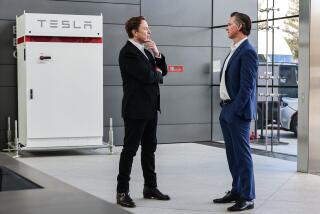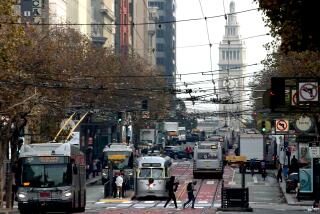In San Francisco, Twitter’s IPO stokes debate over wealth it created
SAN FRANCISCO — Ray McClure was lucky enough not only to get hired as one of Twitter’s first employees but to get some stock.
When he left Twitter in 2007 after one year, McClure cashed out a bit at a time by selling his shares privately. He opened an art gallery with his wife. He bought a house in San Francisco, sold it several years later for a tidy profit, then bought another. And he hasn’t had to work, spending the last year at home caring for his 18-month-old daughter.
“It changed my life in a very positive way,” McClure, 35, said.
No doubt the estimated 1,600 Twitter employees who became paper millionaires with the company’s blockbuster initial public offering last week will one day share that sentiment. Twitter shares closed Monday at $42.90, valuing the online short messaging service at more than $20 billion.
But elsewhere in Twitter’s hometown, the city’s highest-profile IPO in years has prompted a heated debate about whether this newfound wealth should be cheered or feared.
City boosters and the mayor’s office have hailed the IPO and Twitter’s success as catalysts that have revitalized one of the city’s most dismal neighborhoods and cemented San Francisco’s reputation as the world’s start-up leader.
But community activists, already anxious that the tech sector is fueling rising housing costs and evictions, worry that the new Twitter wealth will accelerate trends that are changing the nature of this quirky city.
Although the forces changing the city’s economy extend well beyond Twitter, the timing of its IPO has made it a convenient symbol for both sides wrestling over the city’s economic future.
“Come three to six months from now we’re going to see a lot of new liquid wealth in town. What happens then?” said San Francisco tech entrepreneur Chris Tacy. “My hope is that they’re going to be responsible corporate citizens and figure out a way to give back in a manner that is both appropriate and meaningful.”
In recent years, the center of gravity of Silicon Valley’s tech boom has shifted to San Francisco.
Start-ups in the city raise more venture capital than any other city in the world. And increasingly, younger employees from Silicon Valley companies such as Apple, Google and Facebook are choosing to live in the city and commute.
Gourmet eateries, high-end boutiques and wine bars have popped up all over neighborhoods where tech workers live and work.
The boom has reduced unemployment: San Francisco has the state’s third lowest jobless rate. Tax revenues are filling city coffers. And the city’s skyline is filled with cranes marking a flurry of construction activity.
The bad news: San Francisco had the steepest year-over-year rent increase in the country in the third quarter. The median rent for an apartment in San Francisco was $3,398 a month, up 21% from a year earlier. According to a recent report by the city’s budget and legislative analyst, evictions over the last three years have increased 38% while housing prices have risen 22% over that same period.
Perhaps nowhere is this transformation — and the resulting conflict — more clearly on display than in Twitter’s neighborhood, the so-called Mid-Market area of San Francisco.
The name refers to a stretch of Market Street, which slices diagonally through downtown San Francisco, running from 5th Street to 9th Street, and to several blocks to the north and to the south. For years, Mid-Market has been a seedy, crime-plagued neighborhood so desolate that famed San Francisco Chronicle columnist Herb Caen once called it “le grand pissoir” for the persistent smell of urine.
Mid-Market has stubbornly resisted every attempt at economic revitalization. But two years ago, city leaders struck a deal with Twitter that finally promised to change the neighborhood’s fortunes.
Fast-growing Twitter was threatening to leave the city for a nearby suburb, much like other tech companies that got their start in San Francisco only to migrate in search of more room to grow.
Instead of losing Twitter to Silicon Valley, the city granted Twitter — and any other company that moved to the neighborhood — a payroll tax break.
The city would forgo tens of millions of dollars from taxes on salaries and stock compensation. But the deal was still considered better than nothing, which is what the city was looking at if Twitter left, said Ted Egan, the city’s chief economist.
Twitter moved into an aging 1930s Art Deco building on Market Street that it renovated. The company is now in talks to lease a 320,000-square-foot office next to its headquarters that would more than double the company’s current footprint.
The difference in Mid-Market since Twitter moved in has been stark.
Fourteen technology companies have joined Twitter in the area, including Twitter co-founder Jack Dorsey’s second company, Square. The vacancy rate for storefronts along a five-block stretch of Market Street has fallen from 30% to 22% in just two years, according to the San Francisco mayor’s office. To either side of Twitter’s offices are cranes building high-rise apartment buildings to cater to the city’s growing base of tech workers.
To the east is Ava at 55 Ninth, which, according to its website, will be “a new kind of living space in a stretch of Central Market that’s directly across from the new Twitter headquarters.” The one to the west is Nema, a high-rise consisting of two towers on a lot that had been vacant for decades.
Nema is a kind of playground for early-tech-adopter, affluent residents, with touch screens everywhere, special cellphone signal boosters and abundant Wi-Fi. Signs draped along the side of Nema that faces Market Street declare in big bold lettering: “Tech savvy, not shabby,” “Amenities, not enemies” and “Innovate, don’t imitate.”
Developments such as Nema are required to set aside some units for affordable housing. And companies such as Twitter that move into the Mid-Market area also sign a Community Benefits Agreement that requires them to do 12 things, including “preserve affordable housing and tackle homelessness” and “provide pro bono legal assistance.”
But activists have deemed these steps insufficient, and have said the city has given away too much to these budding tech giants.
Grumbling about the technology takeover of a city of 826,000 known for its counterculture sensibilities has become increasingly common as tensions mount over the widening divide between those riding the good fortunes of the tech boom and those left by the wayside.
That anger was on display last week as Twitter prepared to go public.
Inside Twitter’s headquarters, thousands of employees had arrived early and huddled inside to watch a feed from the New York Stock Exchange on giant screen TVs and munch towers of free doughnuts. Outside, protesters organized by United Public Workers for Action, a labor and community group, sought to draw attention to the growing disparity.
Activists wrapped in bandages lay across the entry to Twitter’s offices next to a coffin with “affordable housing” written on it. One protester read a list of names of people who had been evicted recently while others chanted, “Whose city? Our city!”
Later, a group of smiling employees wearing the company’s iconic blue bird on T-shirts walked around the protesters on their way to a coffee shop across the street where they scooped up a handful of newspapers as mementos.
As they waited to cross the street, a pack of bicyclists rode past. One shouted: “Thanks for ruining our city!”
Caught in the middle of this debate is Ian Padgham, 31, a former Twitter video producer and social media manager.
An artist and longtime Bay Area resident, Padgham lives with his wife, also an artist, in an apartment on the nearby hilltop of Alamo Square.
Padgham said his Twitter stock would have a significant effect on his life, especially for someone who once spent several years as a starving artist in Paris. Still, he has to wait at least six months before selling any options because of a standard lockup agreement. Even then, he plans to put much of the money aside to one day buy a house when he has children.
As for Twitter’s effect on San Francisco, Padgham said the company’s employees and alumni, including himself, were conscious of how others had spent lavishly following IPOs.
Rather then buying pricey luxury goods such as cars or boats, he talked with former co-workers about how they could use their money to invest in other people’s ideas or give back to the community.
“We don’t want to make the same mistakes,” he said. “What I hope is that one day this is seen as a story of a young tech company going public that did a lot of good.”







